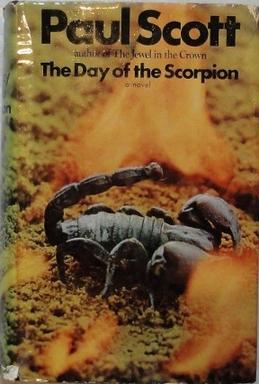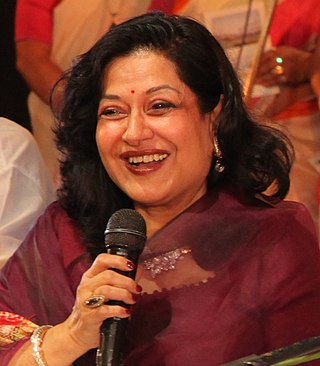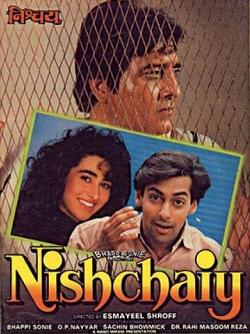
Parvati, Uma or Gauri is the Hindu goddess of power, energy, nourishment, harmony, love, beauty, devotion, and motherhood. In her complete form, she is a physical representation of Mahadevi, also known as Adi Shakti, the primordial power behind the creation of the universe, the creator and destroyer. She is one of the central deities of the goddess-oriented sect called Shaktism, and the chief goddess in Shaivism. Along with Lakshmi and Saraswati, she forms the Tridevi.

The Jewel in the Crown is a 1984 British television serial about the final days of the British Raj in India during and after World War II, based upon the Raj Quartet novels (1965–1975) by British author Paul Scott. Granada Television produced the series for the ITV network.

Bankim Chandra Chatterjee CIE was an Indian novelist, poet, Essayist and journalist. He was the author of the 1882 Bengali language novel Anandamath, which is one of the landmarks of modern Bengali and Indian literature. He was the composer of Vande Mataram, written in highly sanskritized Bengali, personifying Bengal as a mother goddess and inspiring activists during the Indian Independence Movement. Chattopadhayay wrote fourteen novels and many serious, serio-comic, satirical, scientific and critical treatises in Bengali. He is known as Sahitya Samrat in Bengali.

Paul Mark Scott was an English novelist best known for his tetralogy The Raj Quartet. In the last years of his life, his novel Staying On won the Booker Prize (1977). The series of books was dramatised by Granada Television during the 1980s and won Scott the public and critical acclaim that he had not received during his lifetime.
Susan Wooldridge is a British actress. She won the BAFTA Award for Best Actress in a Supporting Role for Hope and Glory (1987). Her television credits include Jewel in the Crown, (1984), All Quiet on the Preston Front (1994–95), and Twenty Thousand Streets Under the Sky (2005).
The Raj Quartet is a four-volume novel sequence, written by Paul Scott, about the concluding years of the British Raj in India. The series was written during the period 1965–75. The Times called it "one of the most important landmarks of post-war fiction."

Kahaani Ghar Ghar Kii is a Hindi-language Indian soap opera on Indian television which ran on Star Plus from 16 October 2000 to 9 October 2008. The soap opera was created by Ekta Kapoor and was produced by her production company Balaji Telefilms which starred Sakshi Tanwar and Kiran Karmarkar.

Devdas is a 1935 Bengali film directed by Pramathesh Barua and based on the Sharat Chandra Chattopadhyay novel, Devdas. It stars Barua himself as Devdas and Jamuna Barua as Parvati (Paro) and Chandrabati Devi as Chandramukhi. This was Barua's first of three language versions of the story, the second being in Hindi and the third in Assamese. The Bengali film was dubbed into Tamil and released in 1936. K. L. Saigal sang two songs in Tamil for this film.(See Ext. links for a link.)

The Day of the Scorpion is a 1968 novel by Paul Scott, the second in his Raj Quartet. It is set in India during World War II as the influence of the British erodes. The novel focuses on old Raj family, the Laytons, the aftermath of the Mayapore incident focused on in The Jewel in the Crown, the Indian politician Mohammed Ali Kasim, and events in the princely state of Mirat.

Moushumi Chatterjee is an Indian actress who is recognised for her work in Hindi as well as Bengali cinema. She was one of the highest paid actresses in Hindi films during the 1970s. She joined the Bharatiya Janata Party in 2019.

The Towers of Silence is the 1971 novel by Paul Scott that continues his Raj Quartet. It gets its title from the Parsi Towers of Silence where the bodies of the dead are left to be picked clean by vultures. The novel is set in the British Raj of 1940s India. It follows on from the storyline in The Day of the Scorpion.

A Division of the Spoils is the 1975 novel by Paul Scott. It is the fourth and final book of his Raj Quartet. The novel is set in the British Raj. It follows on from the storyline in The Jewel in the Crown, The Day of the Scorpion, and The Towers of Silence. Many of the events are retellings from different points of view of events that happened in the previous novels.

Rimi Barnali Chatterjee is an Indian author and professor of English at Jadavpur University.

Anita Nair is an Indian novelist who writes her books in English. She is best known for her novels A Better Man, Mistress, and Lessons in Forgetting. She has also written poetry, essays, short stories, crime fiction, historical fiction, romance, and children's literature, including Muezza and Baby Jaan: Stories from the Quran.

Jasodhara Bagchi was a leading Indian feminist professor, author, critic and activist. She was the founder and director of the School of Women's Studies at Jadavpur University. Her books include Loved and Unloved – The Girl Child and Trauma and Triumph – Gender and Partition in Eastern India. She also founded the women's rights organization Sachetana.

Grahan is a 2001 film directed by Shashilal K. Nair, starring Jackie Shroff, Manisha Koirala and Raghuvaran. The film follows the story of Parvati, a rape victim who quests for justice, and learns that it is not such a simple task.

Nishchaiy is a 1992 Indian Hindi-language film directed by Esmayeel Shroff and released in 1992. The film stars Vinod Khanna, Salman Khan, Karisma Kapoor.

Maud Diver was an English author in British India who wrote novels, short stories, biographies and journalistic pieces primarily on Indian topics and Englishmen in India.
Priya's Shakti is a graphic novel by Ram Devineni and Dan Goldman, whose heroine, Priya, is a "modern-day female superhero", a rape survivor who rides a flying tiger. Issued in 2014, it was followed by Priya's Mirror (2016) and Priya and the Lost Girls (2019).

Mahakaali — Anth Hi Aarambh Hai (English: Mahakali — The end marks the beginning is an Indian television series that premiered on 22 July 2017 on Colors TV. The show traced the epic story of Goddess Parvati’s metamorphosis into Mahakali. Produced by Siddharth Kumar Tewary's Swastik Productions, it starred Pooja Sharma in the titular role of Goddess Mahakali, Sourabh Raj Jain as Lord Mahadev and Kanan Malhotra as Lord Vishnu.
















